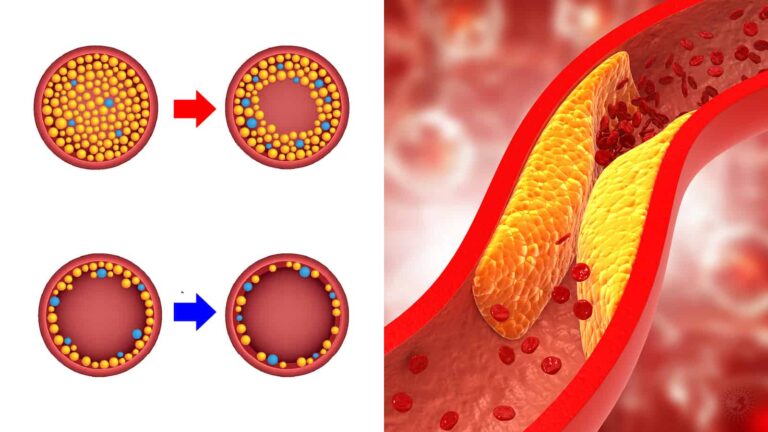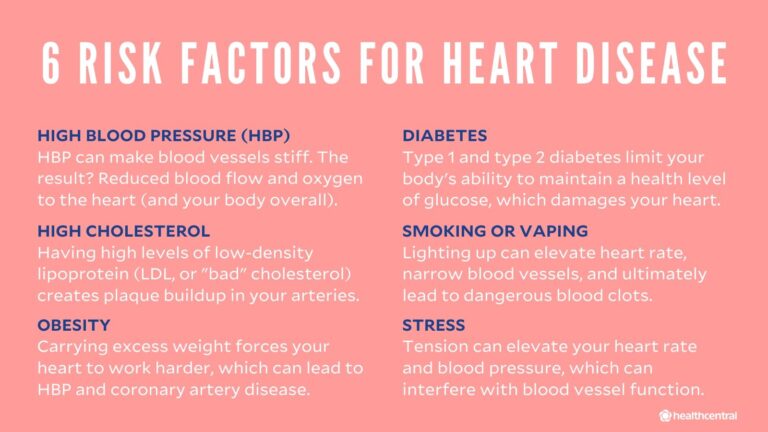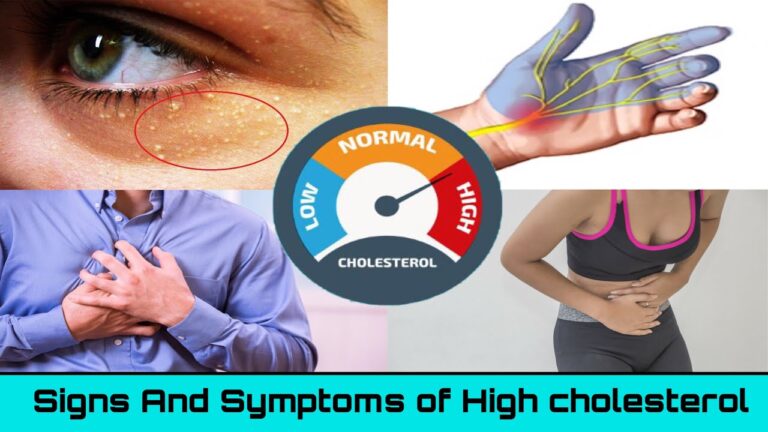WHAT IS A HIGH CHOLESTEROL LEVEL?
Cholesterol is a waxy substance produced by your liver to protect nerves and to make cell tissue and certain hormones. Your body also gets cholesterol from the food you eat. Cholesterol is categorized as “good” (HDL) cholesterol and “bad” (LDL) cholesterol. A high amount of bad cholesterol (LDL) can be harmful to your health.
High cholesterol is a common problem among people of The United States. Good cholesterol is high-density lipoprotein that removes the cholesterol from the bloodstream.
The high amount of LDL cholesterol in your blood may be diagnosed with a high cholesterol condition. If not treated on time high cholesterol may lead to various health issues, including heart attack and stroke.
High cholesterol rarely causes symptoms in the beginning. That’s why it’s important to get your cholesterol levels checked regularly.
 SYMPTOMS OF HIGH CHOLESTEROL
SYMPTOMS OF HIGH CHOLESTEROL
Mostly high cholesterol is a “silent” condition and typically doesn’t cause any symptoms. you may not even realize you have high cholesterol until you develop serious complications, such as a heart attack or stroke.
Some of the conditions that might indicate high cholesterol levels include:
- Soft, yellowish growths or lesions on the skin called xanthomas, might indicate elevated levels of cholesterol.
- People who are obese or have diabetes also have high cholesterol.
- In men, impotence may result from arteries affected by too much blood cholesterol.
- Loose Stool
- Poor appetite
- Fatigue
- Depression
- Weight gain
- Stomach distress
- Heart pain or angina
It is important to have routine cholesterol screening. If you’re 20 years or older, check with your doctor about having routine cholesterol screening.

DISEASES LINKED WITH HIGH CHOLESTEROL
High cholesterol is linked to cardiovascular disease, including coronary heart disease, stroke, and peripheral vascular disease. Diabetes and high blood pressure have also been tied to high cholesterol. One thing common among the underlying problems is the fatty plaque gets built up in arteries caused by high cholesterol.
Common problems linked to high cholesterol levels are:
Coronary Heart Disease :This is the main risk from high cholesterol which can lead to death from a heart attack. Very high cholesterol levels in the blood can lead to build-up in the walls of your arteries called plaque. The plaque over time causes hardening of the arteries or atherosclerosis. Arteries carrying blood to the heart can narrow in certain areas (focal narrowing). This would slow the blood flow to part of the heart muscle. Sometimes, the cholesterol plaques break off and float to smaller blood vessels and cause a partial or total blockage. In some cases, the inflammatory cells might go to the broken plaque area and cause a narrowing of the arteries, thus reducing the blood flow. Reduced blood flow causes chest pain is known as angina, or heart attack if a blood vessel gets blocked completely.
xanthomas
Stroke: Cholesterol plaques not only coat your blood vessels and around your heart, but also narrow certain arteries that lead to your brain. When a blood vessel that carries oxygen and nutrients to the brain becomes blocked or bursts it leads to stroke. A stroke can also result if the blood supply to the brain is reduced or obstructed. Stroke may lead to the part of the brain being devoid of blood and oxygen it needs, so it starts to die.
Peripheral Vascular Disease: In addition to your heart and your brain, cholesterol plaque can build up in blood vessels in other parts of the body, such as your legs, feet, or kidney (peripheral vascular disease). The fatty deposits build up along artery walls and affect blood circulation. The arteries of the kidney can also be affected. You may experience cramps in your calves when you walk that gets better with rest. This is similar to angina pain but in your legs instead of your heart.
Diabetes: Diabetes leads to an imbalance between levels of HDL, or “good” cholesterol, and LDL or “bad” cholesterol. People with diabetes might have LDL particles sticking to arteries and damaging blood vessel walls more easily. Glucose attaches to lipoproteins that remain in the bloodstream longer and may help plaque form. Diabetic people, mainly type 2 diabetes, can have low HDL and high triglyceride levels, boosting the risk of heart and artery diseases. Even if blood sugar is under control, diabetic people tend to have increased triglycerides, decreased high-density lipoprotein (HDL), and sometimes increased low-density lipoprotein (LDL). This increases the risk of developing atherosclerosis.
High Blood Pressure: Doctors are still studying the link between high blood pressure (also called hypertension) and cholesterol levels. High cholesterol might trigger inflammation and the release of certain hormones causing blood vessels to tighten or “constrict”. This may raise blood pressure, known as “endothelial dysfunction. The behavior of blood vessels in this way justifies the link between high blood pressure and heart disease.
Erectile Dysfunction: Over the long term, high cholesterol can lead to erectile dysfunction, which is when a man can’t achieve or maintain an erection during sex. High cholesterol triggers narrowing of the smaller blood vessels of the penis when they should be stretching to allow more blood for an erection (endothelial dysfunction). The high level of LDL cholesterol can build up in arteries and then join with other substances to form plaque that hardens and narrows further blood vessels (atherosclerosis). The high level of LDL can result in less blood flow to both the heart and the penis leading to erectile dysfunction.

PREVENTION OF HIGH CHOLESTEROL
A heart-healthy lifestyle can lower your cholesterol. This can help prevent you from having high cholesterol in the first place. To help prevent high cholesterol, you can:
- Stick to a low-salt diet that emphasizes fruits, vegetables, and whole grains.
- Limiting the number of animal fats.
- Use good fats in moderation.
- Lose extra pounds and maintain a healthy weight.
- Quit smoking.
- Exercise for at least 30 minutes.
- Drink alcohol in moderation.
- Manage stress.
- Symptoms of High Cholesterol

OUTLOOK
A high level of cholesterol increases your risk twice as likely to develop heart disease. This is why it is important to have your cholesterol levels checked, especially if you have a family history of heart disease. Reducing your LDL “bad cholesterol” through a good diet, exercise, and medicine can make a positive impact on your overall health.
If you or anyone you know is suffering from high cholesterol, our expert providers at Specialty Care Clinics will take care of your health and help you recover.
Call 469-545-9983 to book a telehealth appointment for an at-home check-up.
